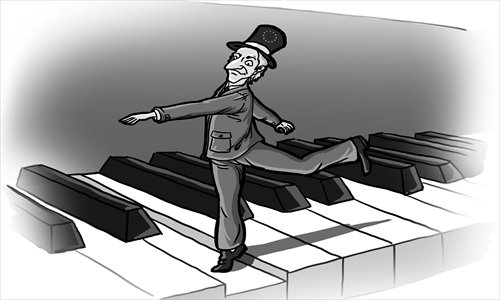HOME >> OP-ED
Europe's soft power gives it significant role in Asia
By Raffaello Pantucci Source:Global Times Published: 2012-8-27 20:40:04

Illustration: Sun Ying
In the article "European powers no longer have role across Pacific" published on August 15 in the Global Times, Robert M. Farley argues that Europe and NATO are not Pacific powers. But this is predicated on a number of false assumptions. First, that trade and economics are irrelevant, second, that hard power is the only effective way of expressing yourself in the region, and third that in our globalized and increasingly multipolar world, there can be spheres of influence where others should not meddle.
The EU is China's largest trading partner, with annual trade in 2011 of $567.2 billion, an 18.3 percent increase year-on-year. And while the US may do more trade with the two next largest East Asian powers, Japan and South Korea, the EU's figures are not insignificant. According to American and European data, in 2011 the US did $194.6 billion in trade with Japan and $100.1 billion in trade with South Korea versus respectively $143.6 billion and $84.4 billion for Europe.
This economic power not only demonstrates why Europe has a keen interest in the region, but also highlights how hard power is not the only way to stay relevant in East Asian and Pacific affairs.
And anyway, the EU does have hard power capacity. Admittedly, the EU lacks the military clout of the US, but it is not a weakling either.
Recent conflicts in North Africa have demonstrated Europe's capacity and willingness to project military power, and these build on a growing European tendency toward consolidation of hard power. The UK and France have put aside historical enmities to develop an ever-closer defense relationship, and over time this tendency will only increase.
That having this muscular power present in East Asia is the only way to be heard seems a very dangerous assumption to make, one that plays into the hands of hawks who see looming conflict at every turn.
The security situation in the region is tense, but surely the solution to this is to find ways to calm things down rather than ratchet them up. That Europe lacks the baggage of hard power in the region could aid in acting the role of honest broker that might be able to help soothe tensions.
This leads to a final point about the current global order. The whole point of globalization is not only that we can now get everywhere easily and talk to people on the other side of the globe without any difficulty, but it also means that the concept of spheres of influence where single powers have total domination has also passed. No longer can powers say, this is my turf and no one else has a stake.
Similarly in East Asia. While much of what happens in the region seems to be fundamentally a tussle between the US and China, the reality is that European trade will be badly affected if things in the region take a turn for the worst. We end up having an order that is confused and unclear and to speak of strictly defined spheres of interest seems antiquated.
None of this is to advocate an aggressive European return to Asia, but rather to highlight that to simply dismiss Europe as an Asian power on the basis that it does not have as many soldiers or aircraft carriers in the region is to be too hasty. The EU is looked up to by ASEAN members who see a model to emulate, European soft power is hard to miss among the floods of Asian tourists enjoying European capitals and, as illustrated, Europe has a very strong economic interest in regional stability.
To presume that the US is the only power to listen to or that matters when focusing on Asian affairs is to play into the hands of those who only see hard power and tensions.
Europe has always been fundamentally an economic power and as the globe's economic focus shifts eastward, we will see this power and influence increase, something that will benefit everyone.
Europe has a keen interest in Asia and it is one that will only grow as the world moves beyond the current economic crisis.
The author is a visiting scholar at the Shanghai Academy of Social Sciences. opinion@globaltimes.com.cn
Posted in: Frontpage